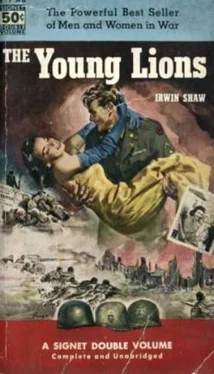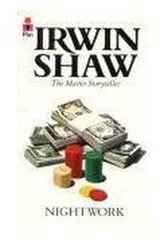Irwin Shaw - The Young Lions
Здесь есть возможность читать онлайн «Irwin Shaw - The Young Lions» весь текст электронной книги совершенно бесплатно (целиком полную версию без сокращений). В некоторых случаях можно слушать аудио, скачать через торрент в формате fb2 и присутствует краткое содержание. Жанр: Классическая проза, на английском языке. Описание произведения, (предисловие) а так же отзывы посетителей доступны на портале библиотеки ЛибКат.
- Название:The Young Lions
- Автор:
- Жанр:
- Год:неизвестен
- ISBN:нет данных
- Рейтинг книги:4 / 5. Голосов: 1
-
Избранное:Добавить в избранное
- Отзывы:
-
Ваша оценка:
- 80
- 1
- 2
- 3
- 4
- 5
The Young Lions: краткое содержание, описание и аннотация
Предлагаем к чтению аннотацию, описание, краткое содержание или предисловие (зависит от того, что написал сам автор книги «The Young Lions»). Если вы не нашли необходимую информацию о книге — напишите в комментариях, мы постараемся отыскать её.
The Young Lions — читать онлайн бесплатно полную книгу (весь текст) целиком
Ниже представлен текст книги, разбитый по страницам. Система сохранения места последней прочитанной страницы, позволяет с удобством читать онлайн бесплатно книгу «The Young Lions», без необходимости каждый раз заново искать на чём Вы остановились. Поставьте закладку, и сможете в любой момент перейти на страницу, на которой закончили чтение.
Интервал:
Закладка:
"We'll get through," Brandt said calmly. "I am sure of it. Now I am absolutely sure of it."
They arrived in Paris the next night. There was very little traffic in the streets. It was as dark as ever, but it didn't look any different from the other times that Christian had come back to it, in the days before the invasion. German staff cars still whipped about the streets; there were fitful gleams of light as cafe doors swung open, and bursts of laughter from strolling soldiers. And the girls, Christian noticed, as they swung across the Place de l'Opera, were still there, calling out to the shadowy, passing uniforms. The world of commerce, Christian thought grimly, continuing whether the enemy was a thousand kilometres away or just outside town, whether the enemy were in Algiers or Alencon…
Brandt was very tense now. He sat on the edge of the seat, breathing sharply, directing Christian through the jumbled maze of blacked-out streets. Christian remembered the other time he and Brandt had rolled down these boulevards, with Sergeant Himmler pointing out places of interest like a professional guide, and Hardenburg in the front seat. Himmler, full of jokes, and now a collection of bones on the sandy hill in the desert; Hardenburg, a suicide in Italy… But Brandt and he still alive, driving over the same streets, smelling the same ancient aroma of the old city, passing the same monuments along the everlasting river…
"Here," Brandt whispered. "Stop here."
Christian put on the brakes and turned off the motor. He felt very tired. They were in front of a garage, a garage with a big blank door, and a steep incline of cement. "Wait for me," Brandt said, climbing hurriedly out of the car. Brandt knocked on a door to one side of the incline. In a moment the door opened, and Brandt disappeared inside.
There was a grinding noise and the blank door of the garage swung open. A light shone dimly at the top of the incline, a gloomy yellow dab in the depths of the building. Brandt came out hurriedly. He looked up and down the empty street.
"Drive in," he whispered to Christian. "Fast."
Christian started the motor and swung the little car up the incline towards the light. Behind him he heard the garage door closing. He drove carefully up the narrow passage-way and stopped at the top. He looked about him. in the dim light he saw the shapes of three or four other cars, covered with tarpaulins.
"All right." It was Brandt's voice behind him. "This is where we stop."
Christian shut off the motor and got out. Brandt and another man were coming towards him. The other man was small and fat and was wearing a homburg hat, half-comic, half-sinister at this moment in this shaded place.
The man in the homburg hat walked slowly around the car, touching it tentatively from time to time. "Good enough," he said in French. He turned and disappeared into a small office to one side, from which came the meagre glow of light from a hidden lamp.
"Listen," Brandt said. "I've sold them the car. Seventy-five thousand francs." He waved the notes in front of Christian. Christian couldn't see them very well, but he heard the dry rustle of the paper. "The money will be very useful in the next few weeks. Let's get our things out. We'll walk from here."
Seventy-five thousand francs, Christian thought admiringly, as he helped Brandt unload the bread, the hams, the cheese, the Calvados. This man cannot be defeated by anything! He has friends and commercial acquaintances all over the world, ready to spring to his assistance at any moment.
The man in the hat came back with two canvas sacks. Christian and Brandt stowed their belongings into them. The Frenchman did not offer to help, but stood outside the shine of the one small light, obscure, watching, expressionless. When the packing was finished, the Frenchman led the way down a half-flight of steps and unlocked a door. "Au revoir, Monsieur Brandt," he said, his voice flat. "Enjoy yourself in Paris." There was a subtle overtone of warning and mockery in the Frenchman's voice. Christian would have liked to seize him and drag him under a light to get a good look at him. But as he hesitated, Brandt pulled nervously at his arm. He allowed himself to be guided into the street. The door closed behind them, and he heard the quiet clicking of the lock.
"This way," Brandt said, and started off, the sack of loot over his shoulder. "We haven't far to go." Christian followed him down the dark street. Later on, he decided, he would question Brandt about the Frenchman and what he would be likely to do with the little car. But he was too tired now, and Brandt was hurrying ahead of him, walking swiftly and silently towards his girl's house.
Two minutes later Brandt stopped at the doorway of a three-storey house. Brandt rang the bell. They had not passed anyone.
It was a long time before the door opened, and then only a crack. Brandt whispered into the crack and Christian heard an old woman's voice, at first querulous, then warm and welcoming as Brandt established his identity. There was the small rattling of a chain and the door opened wide. Christian followed Brandt up the steps, past the muffled figure of the concierge. Brandt, Christian thought, the man who knows precisely on which doors to knock, and what to say to get them open. Someone pushed a button and the lights on the stairway went up. Christian saw that it was quite a respectable building, with marble steps, clean, bourgeois.
The lights went out after twenty seconds. They climbed in darkness. Christian's Schmeisser, slung on his shoulder, banged against the wall with an iron sound. "Quiet!" Brandt whispered harshly. "Be careful." He pushed the button on the next landing and the lights went on for another twenty seconds, in the thrifty French style.
They climbed to the top floor and Brandt knocked gently on a door. This door opened quickly, almost as though whoever lived in the apartment had been waiting eagerly for the signal. A beam of light flooded into the hallway, and Christian saw the figure of a woman in a long robe. Then the woman threw herself into Brandt's arms. She began to sob, brokenly, saying, "You're here, oh, cheri, you're here… you're here."
Christian stood awkwardly against the wall, holding on to the butt of his gun, watching the two people embracing. It was a domestic, husband-and-wife embrace, more relief than passion, plain, unbeautiful, tearful, touching, profoundly private, and Christian felt embarrassed.
Finally, half-sobbing, half-laughing, Simone broke away, pushing back her straight, long hair with one hand, and with the other still clutching Brandt's arm, as though to reassure herself that he was real and to make certain that he would not vanish in the next minute.
"Now," she said, and Christian remembered her light, soft voice very well, "now, we have time to be polite." She turned to Christian.
"You remember Diestl, don't you?" Brandt said.
"Of course, of course." She put out her hand impulsively. Christian shook it. "I am so glad to see you. We have talked about you so often… Come in, come in… You can't stand out in the hall all night."
They stepped into the apartment and Simone locked the door behind them, the sound home-like and secure. Brandt and Christian followed her into the living-room. Standing before the drawn curtains in front of a window was a woman in a quilted robe, her face in shadow, outside the light of the single lamp on the table near the couch.
"Put your things down, oh, you'll want to wash, oh, you must be starving," Simone was saying in a babble of wifely consideration. "We have some wine, we must open a bottle of wine to celebrate… Oh, Francoise, see who's come, isn't it wonderful?"
Francoise, Christian remembered, the German-hater, that's who it is. He watched Francoise warily as she came out from her place near the window and shook hands with Brandt.
Читать дальшеИнтервал:
Закладка:
Похожие книги на «The Young Lions»
Представляем Вашему вниманию похожие книги на «The Young Lions» списком для выбора. Мы отобрали схожую по названию и смыслу литературу в надежде предоставить читателям больше вариантов отыскать новые, интересные, ещё непрочитанные произведения.
Обсуждение, отзывы о книге «The Young Lions» и просто собственные мнения читателей. Оставьте ваши комментарии, напишите, что Вы думаете о произведении, его смысле или главных героях. Укажите что конкретно понравилось, а что нет, и почему Вы так считаете.











